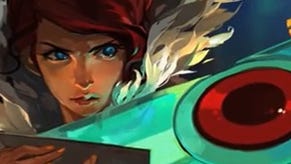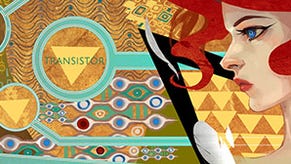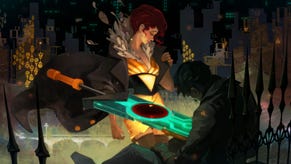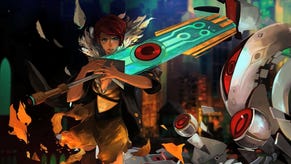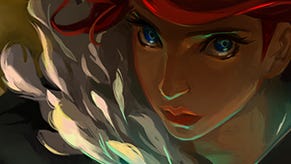Why Supergiant ditched publishers for the release of Transistor - interview
Transistor is the first self-published release from Bastion developer SuperGiant Games. Dave Cook speaks with Greg Kasavin about how it feels to go it alone, and gets fresh information on the game's bold art directon, compelling plot and tactical combat mechanics.
"It is humbling that Sony thinks so highly of us as a team. At this point many of our fans have put a tremendous amount of faith in us, based on what little they've seen of Transistor plus the one game we've made.”
Following up something as well-produced and critically-acclaimed as Bastion was never going to be easy, but for all intents and purposes, SuperGiant seems primed to knock it out of the park again with its next action-RPG Transistor.
Launching May 20 on PS4 and PC, the game stars mute protagonist Red, a former singer who is being pursued across the city of Cloudbank by a mysterious group called The Process.
Her travelling companion is the Transistor, a talking sword that serves as the game's primary voice and the player's means of defence. Together the pair must seek out the weapon's former owners to make sense of why Red is suddenly under threat.
Like SuperGiant's Bastion, Transistor plays out in isometric fashion as players explore the romanticised urban sprawl of Cloudbank's lavish architecture, daubed with colourful hazed lighting and futuristic utopian design. The journey is interspersed with battles that incorporate both real-time and pause-based attacks, giving the game more of a strategic edge than its predecessor, and enabling players to think laterally about how Red uses the Transistor in combat.
"You can play Transistor like an action RPG though within the first few minutes of play you'll discover you have access to some rather powerful abilities," SuperGiant's Greg Kasavin tells me over email. "One of them is called Turn(), which is like a strategic planning mode where you can freeze the world and everything around you, plan out your next set of actions, then execute them in a supercharged fashion.
"You'll be facing fast and powerful foes, though by using Turn() you can control the pace of the fight. Positioning and cover are important factors as you do so. If you end Turn() out in the open, your foes may punish you for it as the ability takes a few seconds to recover. Turn() is there when you need it, and is not something we force players to use. We want it to open up the gameplay for people, and we love seeing different players use it in different ways."
Though Kasavin won't be swayed into telling me exactly why Red is being hunted by The Process, or the true extent of her powers, he teases that there is a mystery shrouding the Transistor's growth as the player gains experience through victory.
"We wanted to see if we could combine the pleasure and suspense of classic turn-based games and tactical RPGs with the immediacy and intuitive feel of an action RPG. We liked the idea of putting that in a science fiction context.”
He explains that the game's suite of powers, such as Mask() - which offers a variety of damage output buffs and brief invisibility - along with other tactical boosts helps keep SuperGiant's combat system out of mindless hack-and-slash territory. I'm told there are literally thousands of power combinations to experiment with.
But what of the Transistor itself? It's clear that something has happened to those who have come into contact with it previously, and SuperGiant's decision to make it sentient poses further questions. While the device serves as the game's primary speaker, it is not an omniscient guide like Bastion's narrator, and as such is only able to comment on events as they unfold before Red. It's a compelling dynamic to say the least.
"There is no narrator in Transistor, so from our point of view the methods of storytelling here are rather different," Kasavin comments, and adds, "Of course there are similarities in that voiceover is used extensively in both games. We came around to using voiceover as a primary method of storytelling in Transistor for a couple of reasons.
"We really like the immediacy it provides, as it lets players go through the game at their own pace without getting interrupted by cutscenes or other non-interactive forms of storytelling. We like the reactivity it provides, as we love those moments when you feel like the game you're playing is responding to the way in which you're playing it, and we love working with Logan Cunningham, who was the voice of Bastion's narrator and plays a principal character in Transistor as well. We hope the way we're using voice in this game feels distinct to Transistor."
Distinct is a good word to use with Transistor, because this is a game that exudes a clear identity, a unique, obscure world and SuperGiant's unmistakable art style. In an industry top-heavy with clones and spins on worn concepts, that's certainly something to be thankful for, and it's interesting to learn that Kasavin and the team never start with a base pitch or overarching theme for its games. It's an organic process that flies in the face of focus testing and 'box-ticker' design.
"Self-publishing felt like a logical next step,” he states, “as digital publishing has evolved to some extent in the last several years to make it easier for smaller teams like ours to get their games onto different platforms.”
"Our games don't really start with a pitch, and we shape them over time," Kasvin explains. "When the dust was starting to settle on Bastion's launch and we realized enough people liked it and bought it that we'd get to stick together as a team and make something new, just like we hoped, we then sat down together and started talking about what we wanted to do next.
"Specifically, we started listing what we called our 'preoccupations'. These were things we were thinking about, which could be anything in any way pertinent to a game… an idea for a character, an emotional state having to do with a certain style of play, ideas for new tech, or anything else. Then we looked for common ground between what folks on the team were thinking about, and took it from there.
"One thing that became clear was that we wanted to make a whole new world from scratch. We really enjoyed creating Bastion's weird fantasy frontier setting, and wanted to see if we could come up with something different. Part of it was that the gameplay direction we were thinking about wouldn't have made much sense in Bastion anyway.
"We wanted to see if we could combine the pleasure and suspense of classic turn-based games and tactical RPGs with the immediacy and intuitive feel of an action RPG. We liked the idea of putting that in a science fiction context."
Transistor's sci-fi setting Cloudbank is both foreign and familiar by design. Its neon hues and far-reaching metallic horizons recall Ridley Scott's vision in Bladerunner, and perhaps foreshadow the evolution of real-world design, but there's something endearing about the flickers of gothic stonework and motifs that dress the environment in such a way that it feels unique.
"While I think it makes sense for Sony to court small independent developers working on interesting games, I also can’t think of what else I’d do if I were in their position. There are far fewer big studios around these days than when the PS3 launched, and consoles needs content”
The debut trailer above sets out that stall wonderfully, while 2D scenes such as Red's silhouette-laden bike ride across a deserted highway provide introspective narrative breaks. These side-on moments were once filled with action, but now they serve as artistic traversal stages that offer a new perspective on the city, if only to make Cloudbank's scale and dense nature clear. The city looks like it will be a well-defined character in its own right.
As Transistor is coming to PS4 and PC initially, I ask Kasavin about SuperGiant's decision to forego publishers and fly solo throughout the project. He tells me that Warner Bros' involvement with Bastion was primarily a pre-requisite to get the game past Microsoft's Xbox Live certification process, but now that several barriers have been lifted on consoles, the team decided to stay entirely self-sufficient this time around.
"Self-publishing felt like a logical next step," he states, "as digital publishing has evolved to some extent in the last several years to make it easier for smaller teams like ours to get their games onto different platforms. At this point we have a good-sized following of fans interested in what we're up to, and we love talking to the gaming press directly. And above all, we love our independence, being able to control and be responsible for every aspect of the games we make. We'll see how the rest of this process goes for us, though thus far we've enjoyed it."
He recalls that Sony first saw Transistor at the same time it was revealed at PAX East last year, and revealed that the company's enthusiasm for the game was both "clear and immediate," with negotiations to bring it to PS4 starting as soon as the show ended.
"The more we learned about the PS4 and the more we saw how serious Sony was about working with a small team like ours, the more we realized it just made a lot of sense," Kasavin stresses. "They've let us do our thing and just wanted Transistor to come out on PS4 whenever we decided it'd be ready, and we decided it'd be ready on May 20. Sony's put a great deal of faith in our team and our game, as evidenced by how prominently they featured us as part of their E3 presentation this past year.
"While I think it makes sense for Sony to court small independent developers working on interesting games, I also can't think of what else I'd do if I were in their position. There are far fewer big studios around these days than when the PS3 launched, and consoles needs content. Where else is there to look these days but smaller teams? It helps that smaller teams are responsible for some of the best, most memorable games of the past few years.
"It is humbling that Sony thinks so highly of us as a team. At this point many of our fans have put a tremendous amount of faith in us, based on what little they've seen of Transistor plus the one game we've made.
"We hope they'll find very soon now that their good faith was well placed."
Transistor launches on PS4 and PC May 20 in North America, before rolling out across other territories. Stay tuned for our final impressions soon.






.jpg?width=291&height=164&fit=crop&quality=80&format=jpg&auto=webp)
